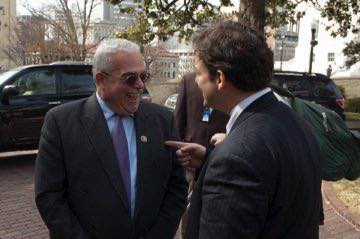The death of Representative Gerry Connolly of Virginia on May 21, 2025, at the age of 75, following a battle with recurrent esophageal cancer, marks not only a profound personal loss for his family, friends, and constituents but also a significant moment in contemporary American political history. Connolly’s passing represents the third death of a Democratic member of the U.S. House of Representatives in office this year, following the similarly heartbreaking losses of Representatives Sylvester Turner and Raúl Grijalva, both of whom also succumbed to cancer-related complications. These consecutive losses have created an unprecedented ripple effect through the halls of Congress, magnifying the fragility of leadership longevity and the deep personal toll exacted by public service.
Gerry Connolly, a figure widely respected on both sides of the aisle, was not merely a longstanding representative of Virginia’s 11th Congressional District. He was a determined policy architect, a shrewd tactician in oversight, a steward of regional development, and above all, a man of principled public service. His political journey, shaped by both academic rigor and local governance, reflected the modern evolution of suburban American politics—from infrastructure advancement to federal transparency initiatives.
Born into an era of global transformation and raised with an acute awareness of governance and accountability, Connolly brought a unique perspective to his roles, one molded in part by his education at Harvard University. His academic background served as the intellectual scaffolding for a career that would blend policy insight with practical application. Harvard, known for shaping future political leaders, imbued in Connolly the analytic tools and strategic foresight that he later applied with remarkable efficacy across local, regional, and federal platforms.
Connolly’s ascent into public life began not with a national campaign or grand platform, but rather with community-focused service. In 1995, he was elected to the Fairfax County Board of Supervisors—a powerful regional body in Virginia with significant influence over land use, transportation, education funding, and social services. For over a decade, Connolly worked diligently to represent the interests of a rapidly growing and diversifying constituency. His tenure on the board lasted until 2009, including five critical years as chairman. In that role, he wielded substantial influence over one of the most populous and economically dynamic counties in the United States, managing growth while navigating the increasingly complex demands of suburban governance.
Among his most notable achievements during this period was his leadership in securing and advancing major infrastructure projects, including the expansion of the Metrorail Silver Line to Washington Dulles International Airport. This project—decades in the making—was not merely a matter of transportation convenience; it symbolized a long-term investment in sustainable regional connectivity, reducing car dependency, and catalyzing economic development along the new transit corridor. Connolly championed the vision, navigated interjurisdictional hurdles, and played a vital role in aligning the federal, state, and local stakeholders necessary to bring it to fruition.
Another milestone of Connolly’s regional leadership was the creation and promotion of the Mosaic District in Merrifield, Virginia. This ambitious mixed-use development project transformed a once-underserved area into a vibrant urban village with retail, residential, and cultural amenities. The Mosaic District became a prototype of smart growth—integrating urban planning, economic development, and environmental sustainability in a way that few regional leaders could claim. For Connolly, it was a manifestation of his belief in the power of thoughtful public-private partnerships to enrich the lives of ordinary citizens.
In 2008, buoyed by his regional success and backed by a coalition of civic leaders and grassroots supporters, Connolly ran for Congress. His election to represent Virginia’s 11th District in the U.S. House of Representatives marked the beginning of a 16-year tenure in federal legislative service, during which he would emerge as a leader on issues ranging from government oversight to civil service reform. Representing a district encompassing much of Fairfax County—a region characterized by its federal workforce, ethnic diversity, and technocratic economy—Connolly was ideally positioned to serve as a liaison between national policy and regional impact.
Once in Congress, Connolly’s legislative portfolio quickly reflected his dual commitments to oversight and development. He became known for his expertise on federal workforce issues, government accountability, and technology modernization. His role as the top Democrat on the House Oversight and Accountability Committee placed him at the nexus of some of the most consequential inquiries into federal conduct, especially during times of heightened political polarization. His oversight work was defined not by partisanship but by his methodical insistence on transparency, good governance, and adherence to democratic norms.
Connolly’s political style was characterized by a combination of pragmatism, wit, and intellectual depth. Even as partisanship increased throughout the 2010s and 2020s, he maintained relationships across the aisle and was frequently called upon for his institutional knowledge and calm demeanor. His presence in hearings often brought a level of seriousness to deliberations, grounded in both his academic background and his lived experience as a local administrator and federal legislator.
In April 2025, Connolly made the difficult decision to announce that he would not seek reelection in 2026, citing health concerns after the recurrence of his esophageal cancer. This was a solemn moment not just for his supporters but for the broader congressional community. That same month, he stepped down from his high-profile role on the House Oversight and Accountability Committee, signaling a transition that few expected would culminate so quickly in his passing just weeks later.
Esophageal cancer, a particularly aggressive and challenging form of the disease, had previously threatened his health, but Connolly had fought through earlier bouts with resolve. The recurrence, however, signaled the relentless nature of the illness. The American Cancer Society reports that esophageal cancer has one of the lower five-year survival rates among major cancers, largely due to late diagnosis and its tendency to metastasize quickly. Connolly’s openness about his condition and his decision to step back from reelection illustrated his characteristic transparency—choosing to face his mortality publicly, with the same honesty that had defined his political career.
His death was not an isolated occurrence in the Capitol; rather, it formed part of a somber pattern. Connolly was the third sitting House Democrat to die in office in 2025 due to cancer-related causes. Representative Sylvester Turner of Texas and Representative Raúl Grijalva of Arizona had preceded him in death earlier in the year, both also succumbing to the ravages of cancer. Turner, a former mayor of Houston, had brought urban reform and minority advocacy to the national stage. Grijalva, a veteran legislator from Arizona, had been a stalwart of progressive causes, from immigration rights to environmental justice. Their collective departures within the span of months have created a rare moment of introspection within Congress, one where institutional knowledge and elder leadership have been diminished at a time when policy continuity and wisdom are deeply needed.
The reaction to Connolly’s death was immediate and heartfelt. Tributes poured in from both Democratic and Republican colleagues, many of whom praised his unwavering dedication to public service, his mastery of policy details, and his personable approach to political discourse. House Minority Leader Hakeem Jeffries described Connolly as a “pillar of integrity,” noting that “his commitment to government accountability was matched only by his compassion for the people he served.” On the other side of the aisle, Republican lawmakers echoed similar sentiments, highlighting Connolly’s reputation for fairness in oversight proceedings and his depth of knowledge about federal administrative systems.
Beyond the realm of politics, Connolly’s death resonated deeply with his constituents and those who had worked closely with him over the years. His wife, Cathy, and daughter, Caitlin, survive him. Both were often at his side during public events and played a crucial role in supporting his extensive public commitments. Their presence throughout his career added a deeply human dimension to his public persona, grounding his political endeavors in the values of family, compassion, and continuity.
The long-term implications of Connolly’s passing will likely be felt in several key areas. First, his absence leaves a significant leadership gap in the oversight arena, a domain where institutional memory and experience are paramount. At a time when misinformation and disinformation challenge the credibility of government institutions, leaders like Connolly—who understood both the architecture and the fragility of federal governance—are not easily replaced.
Second, his departure will catalyze a competitive political process in Virginia’s 11th District. As one of the most economically significant and demographically diverse districts in the Commonwealth, its representation will be critical in shaping the region’s response to federal policy, particularly in areas such as transportation, public health, housing, and technology. The eventual special election to fill his seat will no doubt attract a wide range of candidates seeking to continue or reshape Connolly’s legacy.
Lastly, Connolly’s death, in conjunction with those of Turner and Grijalva, may spark broader conversations about congressional tenure, healthcare for public servants, and the mental and physical toll exacted by continuous service in one of the most demanding political institutions in the world. It raises questions about succession planning, wellness support for aging legislators, and how institutions should respond to the personal vulnerabilities of those in power.
As the nation mourns the loss of Gerry Connolly, it also reflects on the enduring value of a life dedicated to service. From his early days in county government to his commanding presence in congressional oversight, Connolly exemplified the best traditions of American public life: fidelity to community, respect for governance, and an unwavering belief in the power of thoughtful policy to improve lives. In an era increasingly defined by polarization and volatility, Connolly’s steady hand and moral clarity offer a poignant reminder of what principled leadership looks like.
His memory will not merely be preserved in tribute speeches or dedications; it will live on in the infrastructure projects he championed, the legislation he shaped, and the countless civil servants and citizens whose lives were enriched by his vision. As the political world turns without him, his legacy remains—etched into the architecture of government, the streets of Fairfax, and the conscience of a grateful nation.


Leave a Reply